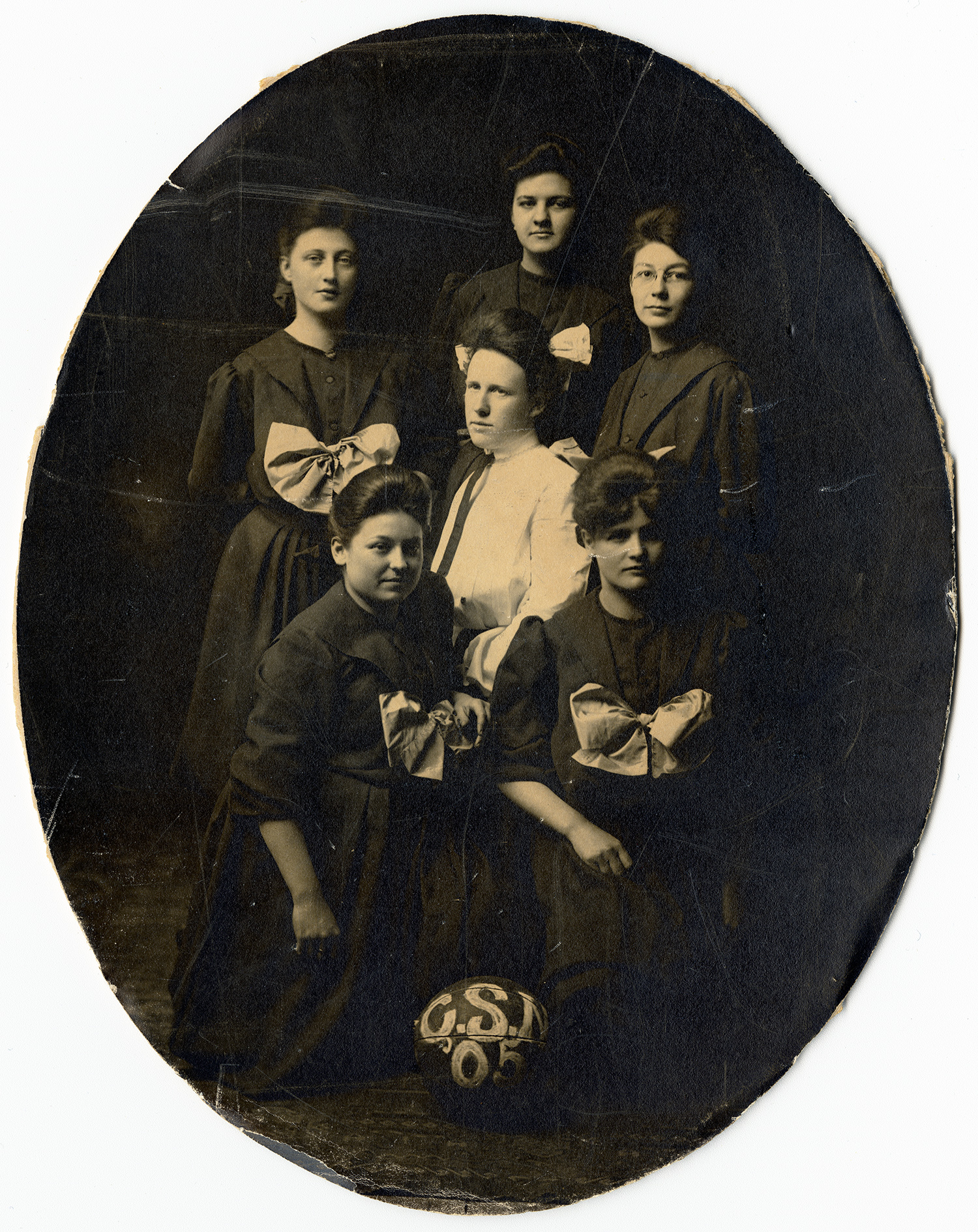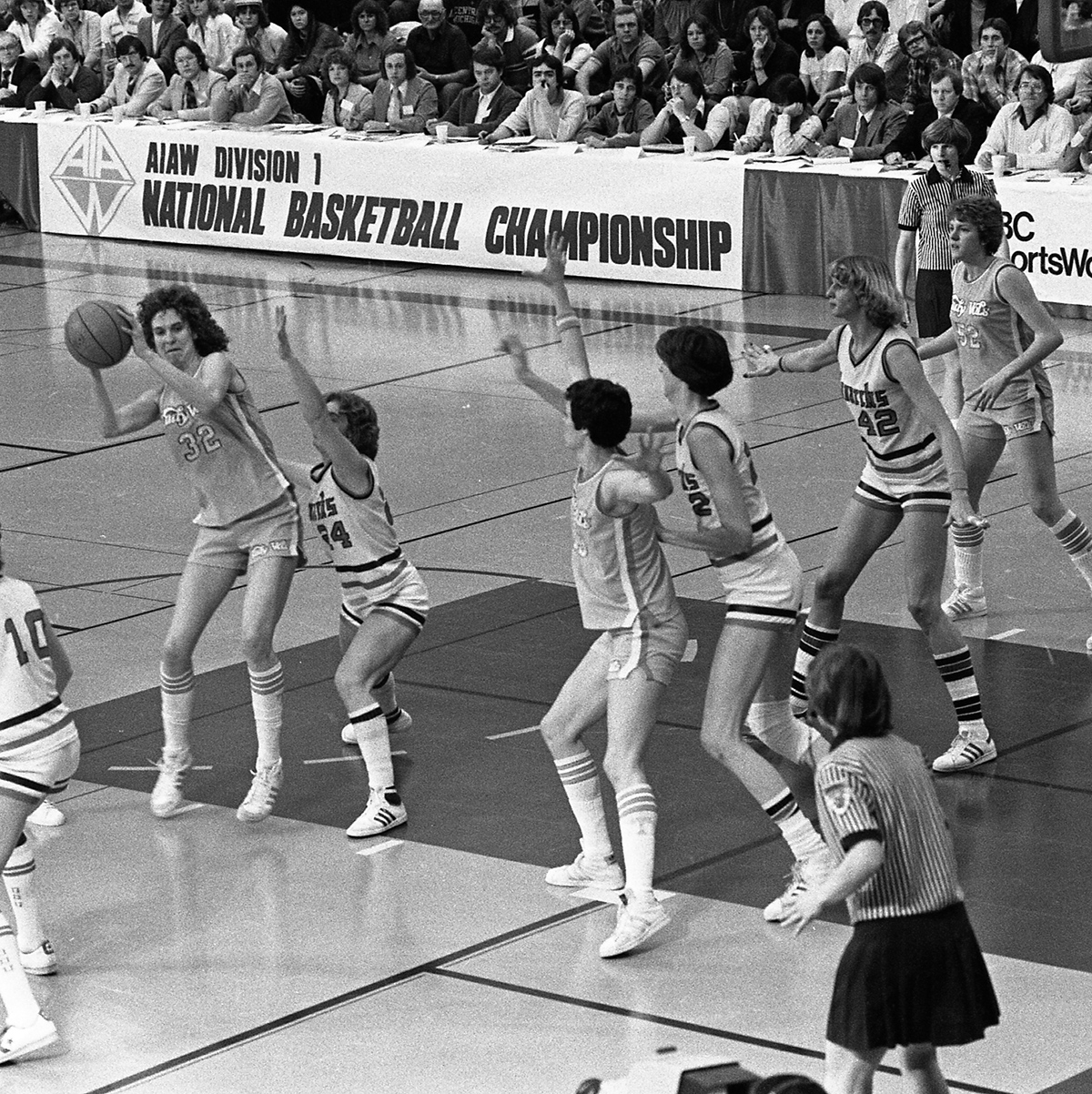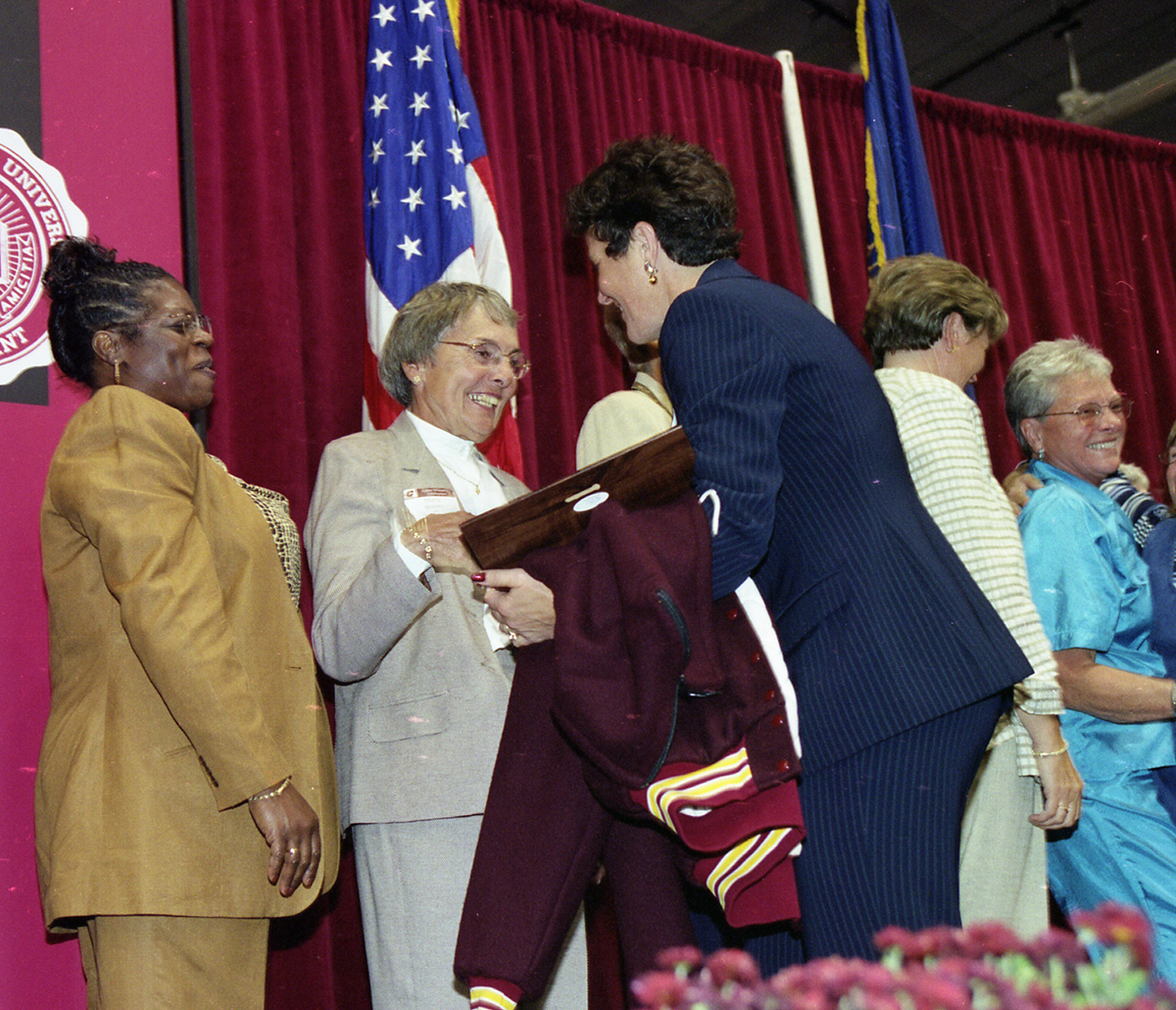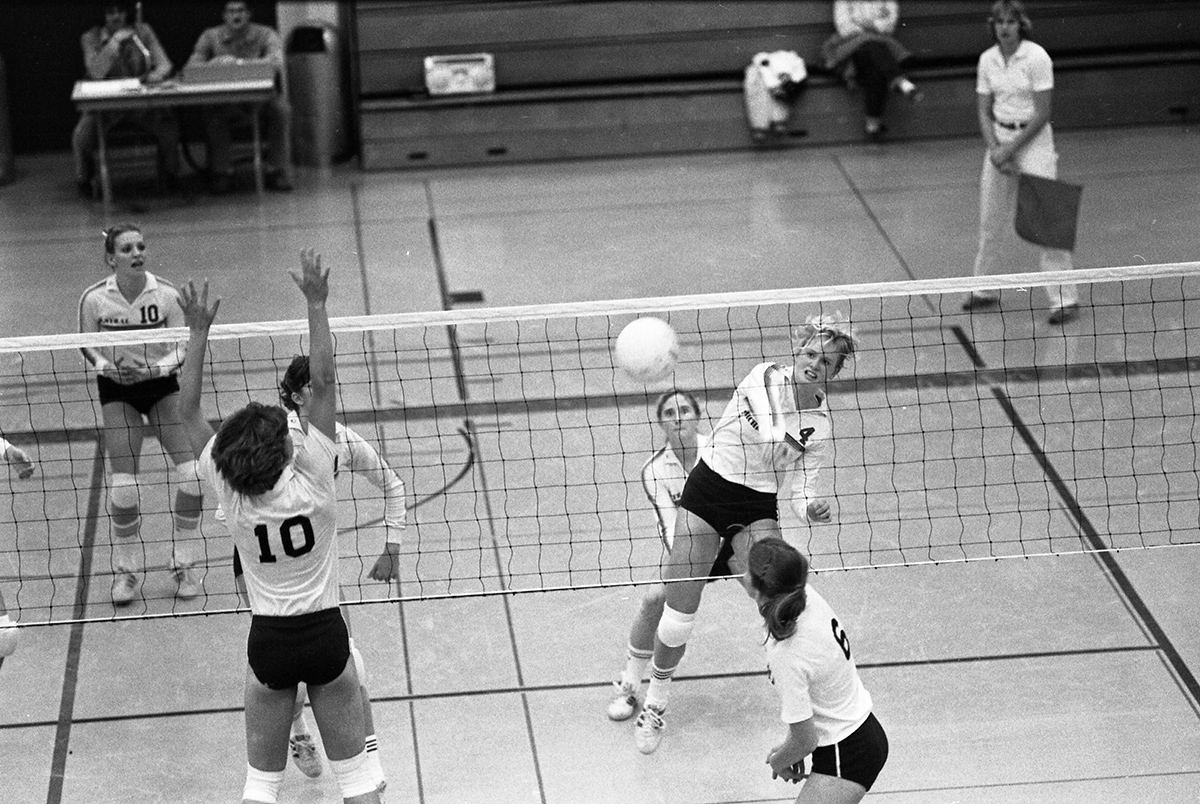CMU Women's Athletics Timeline
 |
| Central Michigan Normal Women's Basketball team, 1905, from the CMU Photographic Vertical File |
1899: Central hosted its earliest Athletic Field Day, including the school’s first official competitions in track and field, wrestling, and gymnastics. Women had a day of firsts at the event, as well, with student-athlete Myrra Hepburn competing in an event called “club swinging”—marking the first time a Central woman competed in intercollegiate sports.
1905: Women began to compete regularly in interschool athletic events. For Central Michigan Normal School (CMNS) women, basketball and field hockey formed the most popular sports attractions. Women’s basketball played its earliest game in 1905, with the Lady Normalites winning 24-13 over the Midland High School team.
1913: The early era of intercollegiate competition for Central women came to an end when CMNS indefinitely ended women’s sports against other institutions. Bertha Ronan, a physical training director at CMNS, announced the end of women’s intercollegiate competition in a Central Normal Bulletin article, stating that playing to win was not something the young women were physically strong enough to endure.
1945: For the first time in over three decades, women participated in intercollegiate athletics. Beginning in the fall of 1945 and lasting for the next nearly twenty years, women from Albion College, Alma College, and other schools in Michigan joined with members of Central's Women’s Recreation Association to participate in “play days.” These days of organized competition featured basketball, volleyball, tennis, badminton, and field hockey and represented a small move toward equality for women on campus.
Late 1960s: The women’s athletics program at CMU evolved and moved away from the “play day” model to one with more regular competition resembling more closely the organization of college sports in the twenty-first century.
1967: CMU joined its first women's basketball league. The season was four games with a limited postseason. By 1976, CMU competed in the Midwest Association of Intercollegiate Athletics for Women (the MAIAW) in a variety of sports (swimming and diving, basketball, volleyball, and gymnastics), and the basketball season had more than 20 games.
1972: Title IX of the Education Amendments of 1972 was enacted and codified gender equality in all aspects of education. By encompassing extracurricular activities, including athletics, those who advocated for equity in women’s and men’s sports at the college level now had an enforceable law to support their efforts. As equity in athletics developed, CMU's women athletes, coaches, and administrators advocated for the basic necessities to succeed at a high level:
- Hotel accommodations for women. Before having a dedicated budget for hotel rooms when on the road, teams often found other accommodations, including staying with a player's family who lived in the area, while men's teams received accommodations.
- CMU-provided meals for women's teams. Prior to women's teams having nutrition plans and meals provided by CMU, athletes were responsible for their own food, while men's teams were provided with a meal.
- Equity in facilities and equipment. Even after Rose Arena opened in 1973, the volleyball team competed in Finch Fieldhouse.
- Athletic scholarships for women in addition to the men. Prior to Title IX, many universities did not allocate funds for providing women athletes with scholarships, while they did so for men.
 |
| Old Dominion vs. Tennessee in the 1980 AIAW National Championship at Rose Arena |
1972: CMU's men's teams joined Division I of the NCAA (football moved to Division I in 1975). It would be another ten years before women's programs were added to NCAA governance.
1977: CMU hosted the AIAW National Gymnastics Championships. Pat Podoll, faculty in physical education at CMU and meet director of the event, was instrumental in bringing the gymnastics championship to Central. The event was the first time that CMU was selected as the host for an intercollegiate athletics championship and the more than 7,000 people who attended were delighted by Central's operations. The two-day competition brought in compliments from athletes, coaches, and fans and thrust CMU into the national spotlight.
1980: CMU hosts the Association for Intercollegiate Athletics for Women (AIAW) National Basketball Championship. Mt. Pleasant welcomed legends of women's college basketball from Louisiana Tech, Old Dominion, South Carolina, and Tennessee for the semifinal and championship games, with Old Dominion defeating Tennessee in the finals. The event was a success on all accounts: the competition was excellent; the public was engaged; the athletes, coaches, and fans enjoyed the experience; and the tournament was financially successful. Similarly successful the following year at the 1981 AIAW national championship in Eugene, Oregon played a major role in the NCAA’s decision to put on their own women’s national basketball championship beginning in 1982.
1980-1981: NCAA Division II and III began accepting women’s programs into their organizations. A year later, in the 1981-1982 season, Division I followed suit and accepted the first women’s programs as affiliates. The NCAA attracted many of the AIAW powerhouse teams and the AIAW folded in 1982.
1985: CMU women athletes received varsity letters for the first time. Prior to 1985, only men were able to receive this honor, leaving hundreds of women’s athletes without the same level of recognition.
 |
| Varsity Letter Award night, 2000 |
2000: CMU welcomed back women athletes who played prior to 1985 to retroactively receive their varsity letters. The result: 235-250 woman athletes from as far back as 1946 received their varsity letters on October 14th, 2000. Fran Koenig, former basketball coach (1969-74) and director of women's athletics/associate athletic director (1974-89), was vital in organizing the event. The day before, she passed away, and she unfortunately did not witness the remarkable celebration of women’s athletics and the testament to Koenig’s incredible life and tireless work. Marcy Weston, another legend of CMU athletics, said of the night: “It was an electrifying evening. It was probably the most heartwarming, memorable event I've been to." She added: “The aura and energy in the room, I don’t know if I’ve ever experienced anything like that in my 28 years at CMU.”
2002: CMU established the Title IX: Gender Equity Committee. The committee, made up of students, faculty, and staff from CMU's athletics, academic, and administrative units, was tasked with holding the university accountable for complying with Title IX. CMU maintains compliance through "substantial proportional representation," meaning the ratio of female to male athletes is reflective of the ratio among the student body at large. The Title IX: Gender Equity Committee for Athletics released a comprehensive report in 2012 that detailed CMU's ongoing compliance with Title IX, such as CMU creating women’s golf and lacrosse teams to offer increasing opportunities for women athletes at Central.
 |
| CMU Women's Volleyball in action, circa 1980-81 |
Former CMU women’s athletes have reflected on the impact of Title IX on the women who play sports at CMU, both past and present.
- Terri Phillion-Dulude, a volleyball player at CMU and the recipient of the first ever full-ride athletic scholarship given to a woman in Michigan, called the language of Title IX “37 words that changed everything for women.”
- Denise Gotham, who also played volleyball at CMU and whose daughter followed in her footsteps as a CMU volleyball athlete, remarked: “I’m always saying, look what they have now. The uniforms, the equipment, the big screen videos. They have weight-lifting equipment. They have enough nets.” Gotham added: “Title IX has allowed girls to be aggressive, get sweaty, have strong bodies, go after their goals, and still be feminine, beautiful, and respected by males and females of all ages.”
2008: Marcy Weston, a legend of women's athletics at Central and across the United States, received the Gold Whistle award from the National Association of Sports Officials. She was the first woman to ever receive the honor. Among the numerous other honors she received for her contributions to athletics and officiating, Weston was recognized by the Women’s Basketball Coaches Association with the Jostens-Berenson Service Award in 1994—Weston pointed out that it was quite special because she earned it as an official, which is a tremendous honor coming from coaches, who aren't always fans of the officials.
2022: To commemorate the 50th anniversary of the enactment of Title IX, the Grand Marshals for Central Michigan University's Homecoming were six legendary CMU coaches and administrators: Christy Freese, Sue Guevara, Margo Jonker, Marcy Weston, and posthumous honorees Mary Bottaro and Fran Koenig. As part of the Homecoming festivities, the four living Grand Marshals were joined by Tangela Cheatham, CMU’s Deputy Athletic Director for Administration and Senior Woman Administrator, for a recorded panel discussion about the legacy of Title IX on women's athletics at CMU and beyond.
